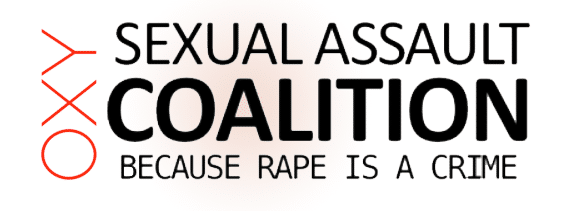For the past two semesters, the Occidental Sexual Assault Coalition (OSAC) has been campaigning to fulfill the third goal outlined in its members’ statement to the Occidental community October 2017: to amend Greek Council’s regulations regarding the prevention of sexual harassment, battery and assault in all Greek organizations. Greek Council Vice President of Diversity and Equity Elizabeth Andrews* (junior) will propose new Bylaws for Sexual Assault Prevention and Awareness at Greek Council’s next meeting Thursday, April 26. Micaela Stevens (senior), a member of OSAC, has been working with Andrews and a committee consisting of representatives from all Greek Council affiliated organizations to form the proposed bylaws. The bylaws intend to formalize an accountability structure for sexual assault in Greek organizations. Although the bylaw committee and OSAC overlap in membership, Greek Council is the organization formally crafting the bylaws.
According to Stevens, there are three main components of the bylaws. First, a value statement on sexual violence which gives organizations the ability to remove members if the statement is broken; second, mandatory education from Project S.A.F.E. (for a Sexual Assault Free Environment) and the Title IX Office; third, safe party guidelines, including sober siblings, open-alcohol container policies and publicized guest lists. The bylaws require already existing Project S.A.F.E liaisons within each Greek organization to expand their responsibilities to ensure their organizations are adhering to the bylaws.
Title IX Coordinator Jennifer Broomfield, Project S.A.F.E. Program Manager Marianne Frapwell, Silva and Dean of Students Rob Flot were involved in the drafting and revision of the bylaws through an invitation from the committee.
According to Associate Director of Student Activities and Greek Life Diego Silva, Stevens suggested creating a new position in Fall 2017: the Greek Council Vice President of Sexual Assault, Education and Prevention. Silva said he then advised the council to create a committee to discuss the creation of this position and bylaw changes. After its formation Fall 2017, the committee shifted focus to creating sexual assault specific bylaws. Stevens said she is hopeful the VP position will be revisited in the future.
Romy Hackl (junior), who is a member of OSAC and the Project S.A.F.E. Liaison for Zeta Tau Zeta (often referred to as “Zeta”), said that these initial meetings inspired Stevens to explore the idea of re-establishing OSAC in response to the sexual assault climate on campus.
“Part of our goals became finalizing [the bylaws] so we can feel more comfortable with the situation taking place,” Hackl said.
Andrews, Stevens and the committee met frequently to craft the bylaws document, according to Kappa Alpha Theta (Theta) Project S.A.F.E. liaison Naomi Newman (senior). Theta President Mia Smutny said that Andrews made the document accessible to Greek Council via a shared document. Andrews also hosted office hours to ensure that the amendment process was collaborative.
Newman said that OSAC had an impact on the construction of the bylaws, but the bylaws were not a product of OSAC’s re-establishment.
“It was definitely not something that was reactionary,” Newman said. “It’s been in development and it was just really helpful that we had this movement on campus.”
According to Alex Morse (senior), academic chair and chapter leader of Zeta, members rely heavily on the Title IX Office for resources related to sexual assault. Morse said this often makes the role that Greek organizations play during sexual assault investigations unclear. The proposed bylaws clarify what role and oversight these organizations have and formalize the distinction of responsibility between the Title IX Office and Greek organizations.
Broomfield said a lot of the bylaws were on target from the beginning, including details about mandatory training, Project S.A.F.E. liaisons and sober sibling policies.
“The work that needed to be done was being sure that we weren’t asking Greek organizations to do things that the Title IX office should be doing or Campus Safety should be doing, so we had a really great conversation about that,” Broomfield said.
According to Newman, although details of the bylaws may seem like common sense, it is important to have formalized responsibilities for Greek organizations regarding these topics.
“For us to say our Greek life is immune to these problems would be so foolish and ignorant,” Newman said.
Zeta Tau Zeta Co-Recruitment Chair Ann Garber (sophomore) said that Zeta consistently involved all members in conversations related to the bylaws.
“At every chapter, we bring up the updates about the bylaws being remade,” Garber said.
Hackl said she thinks the bylaws will set a new standard for future pledges.
“Just having that standard in place kind of already inherently puts in the mind of future Greeks that this is important to adhere to, your membership is at risk if you don’t respect the bylaws,” Hackl said.
Alpha Lambda Phi Alpha Project S.A.F.E. liaison Emma Robitaille (junior) said she was frustrated that there was no previous regulation regarding sexual assault prevention, advocacy and education for Greek life.
“My hope for these bylaws is that they will help to contribute to making all spaces in Greek life safer and more empowering,” Robitaille said via email. “I think in the short term, however, they will create a broader discussion around the presence of sexual violence in Greek life and how we are actively working to end it.”
*Elizabeth Andrews is a layout editor for The Occidental.
![]()




































